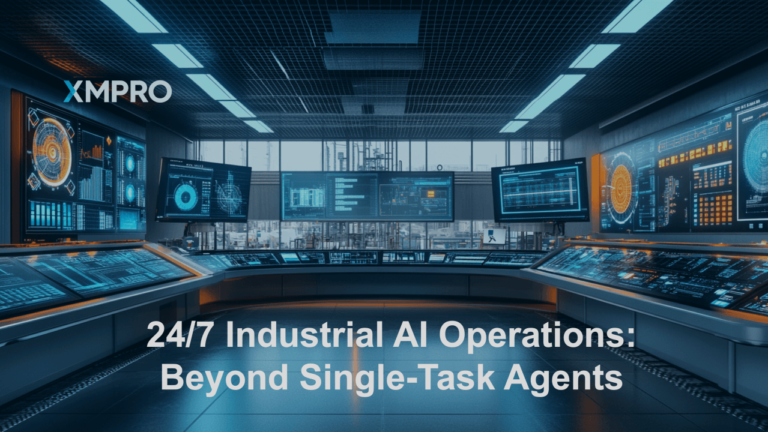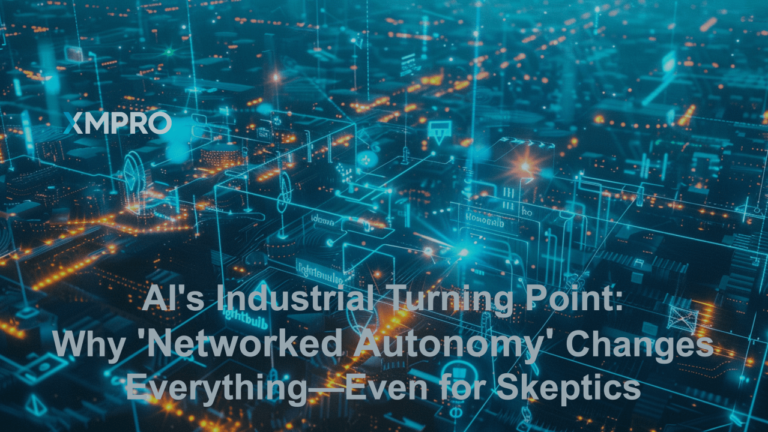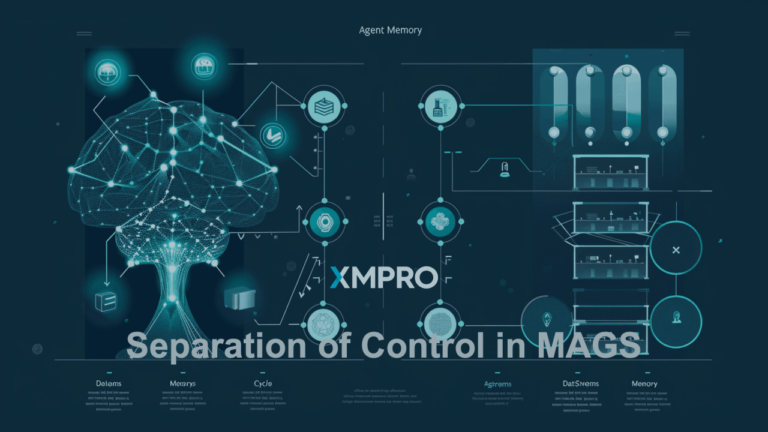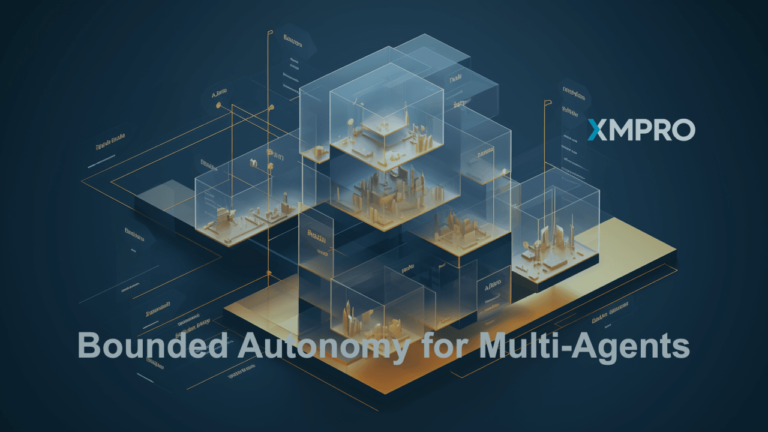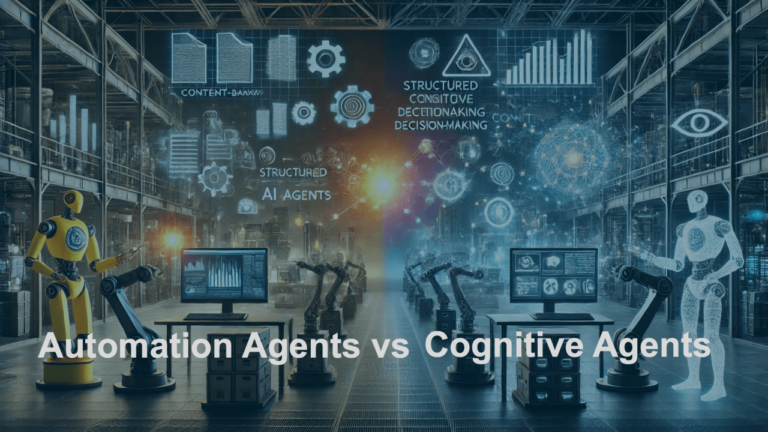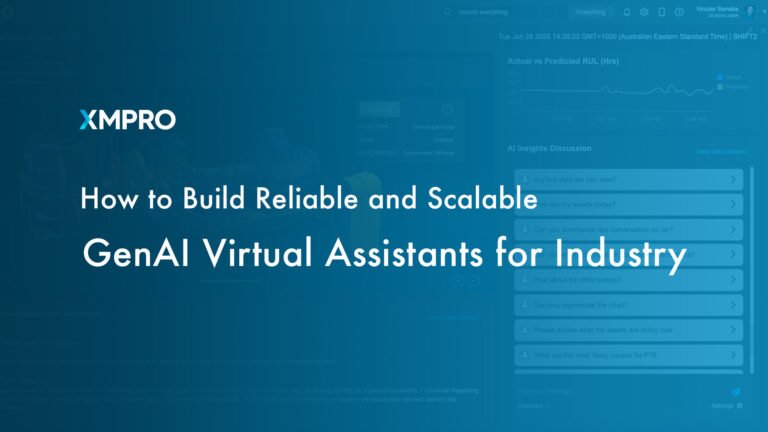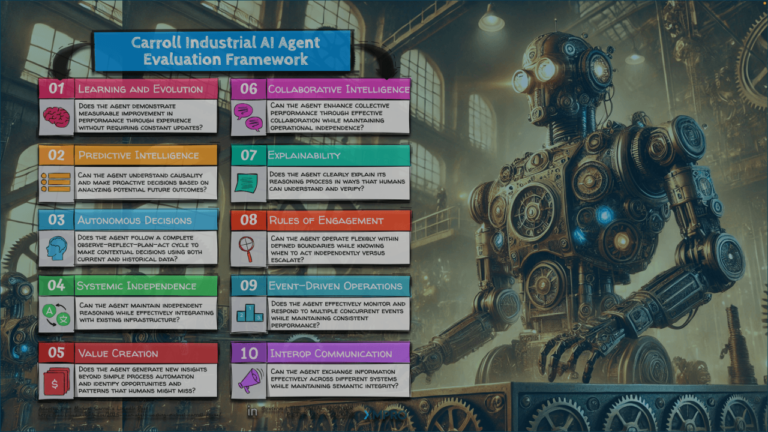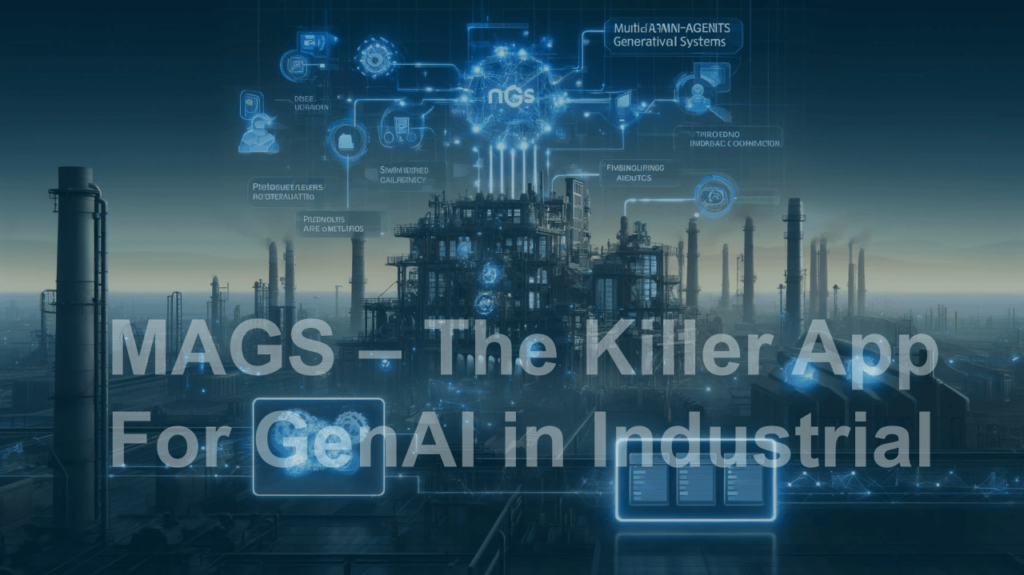
MAGS: The Killer App for Generative AI in Industrial Applications
This article was originally posted to XMPro CEO, Pieter Van Schalkwyk’s blog – The Digital Engineer, here
In today’s industrial environments, complexity is increasing at an unprecedented pace. With interconnected systems, IoT devices, and advanced digital monitoring, the sheer volume of data generated daily can easily overwhelm even the most experienced operators. At the same time, industries face a “knowledge exodus” as seasoned experts retire, taking years of accumulated insights and best practices with them. Combine this with rising energy costs, stringent regulatory requirements, and growing pressure to operate sustainably, and it’s clear that traditional approaches to managing operations are falling short.
This is where Multi-Agent Generative Systems (MAGS) come in. Leveraging the power of Generative AI, MAGS offers a transformative approach to tackling some of the most pressing industrial challenges. Unlike conventional systems, MAGS reduces the cognitive load on operators, functions with the precision of industrial control systems, and delivers continuous, data-driven improvements through machine intelligence. These capabilities make MAGS not only a valuable tool but a “killer app” for Generative AI in industrial settings.
Let’s explore this in more detail.

Industrial Challenges
1. System Complexity
Today’s industrial systems are more interconnected than ever, with IoT devices, digital monitoring tools, and other sophisticated equipment generating vast amounts of data and alerts. Operators often receive thousands of notifications daily, leading to cognitive overload and a drop in operational effectiveness. This constant influx of data demands a sophisticated approach to prioritize and act on critical information, helping operators maintain control without being overwhelmed.
2. Workforce Knowledge Retention
As experienced personnel retire, organizations face a “knowledge exodus” where valuable operational insights and best practices are lost. Traditional knowledge transfer methods are often insufficient, especially as technological advancements outpace the training process. This creates a widening knowledge gap that impacts safety, efficiency, and decision-making capabilities across industrial environments, posing a substantial risk to operations.
3. Intense Operational Pressures
Industrial organizations are increasingly pressured to deliver peak performance with limited resources while managing rising energy costs and strict regulatory requirements. According to the International Energy Agency (IEA), industrial energy costs are projected to grow by 3% annually due to market volatility and increased consumption. At the same time, environmental regulations, such as the European Union’s Green Deal, require industries to reduce emissions by 55% by 2030. Failing to comply with these standards can lead to substantial financial penalties and reputational damage, and inefficient resource use directly affects profit margins.
These operational demands require organizations to achieve higher efficiency, stay compliant, and minimize resource consumption, often with leaner teams. Maintaining productivity under these pressures has become crucial for industrial competitiveness and long-term sustainability.
How MAGS Solves These Challenges
Multi-Agent Generative Systems (MAGS) provide an impactful application of Generative AI tailored to tackle these critical industrial challenges in three core ways:
1. Reduces Cognitive Load
Industrial operators face an overwhelming cognitive burden in today’s complex operations, with systems generating over 1,000 daily alarms per operator—up dramatically from the historical norm of 60-100 alarms. Modern control rooms require operators to monitor up to 7 screens simultaneously while tracking physical equipment and digital systems, creating an unsustainable cognitive load. Research shows operator performance drops significantly after just 25-30 alarms in a 10-minute period, highlighting the critical need for a new approach.
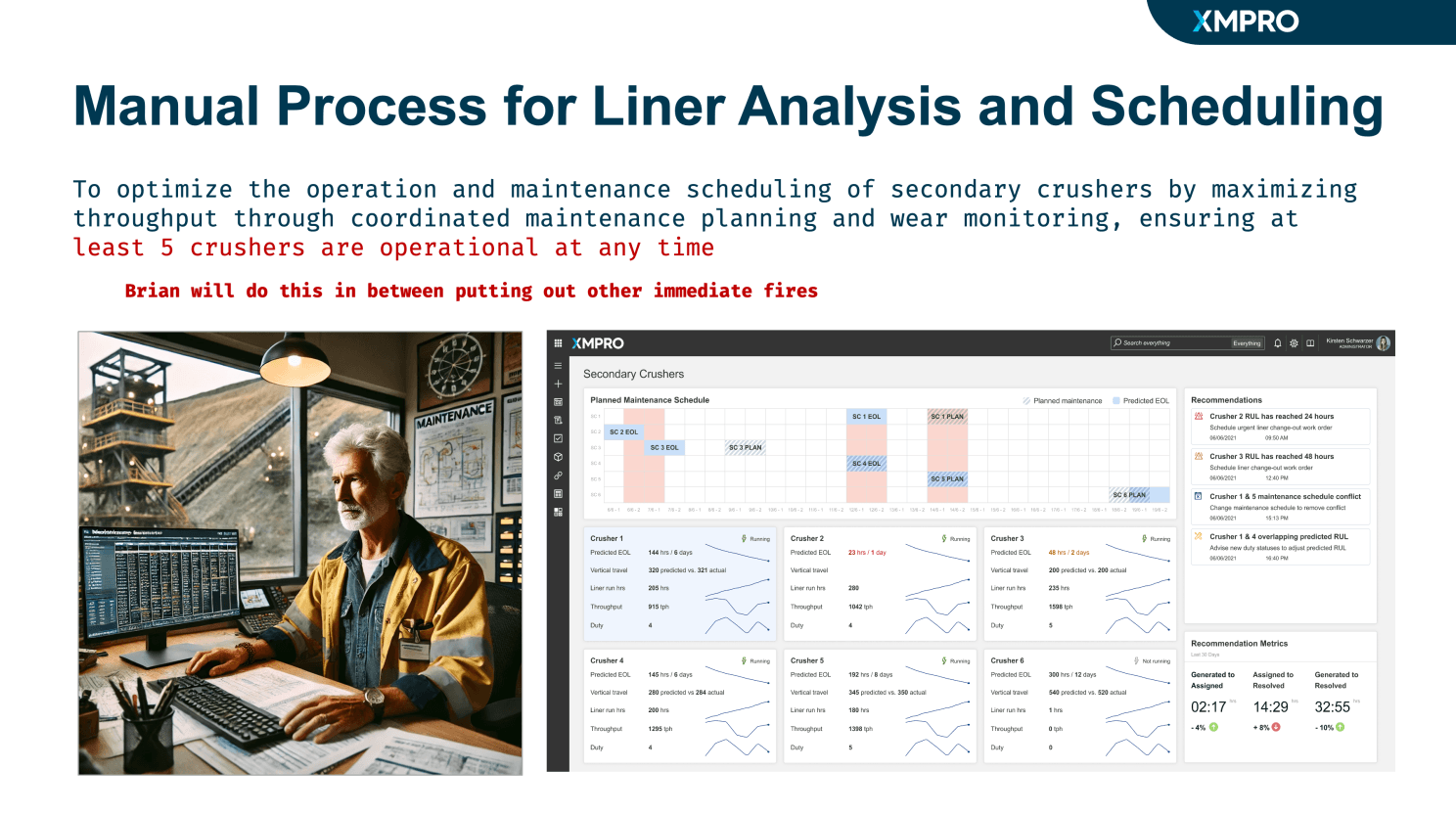
A Human Operator Optimizing Maintenance Schedules for Liner replacements on Secondary Crushes in Mining to avoid unplanned downtime due to liner wear
MAGS addresses this challenge by deploying teams of virtual workers that autonomously handle routine tasks within defined Safe Operating Envelopes. These AI agents work as a coordinated team to monitor and autonomously manage operational business processes and maintain operational logs—all while strictly adhering to predefined safety parameters.
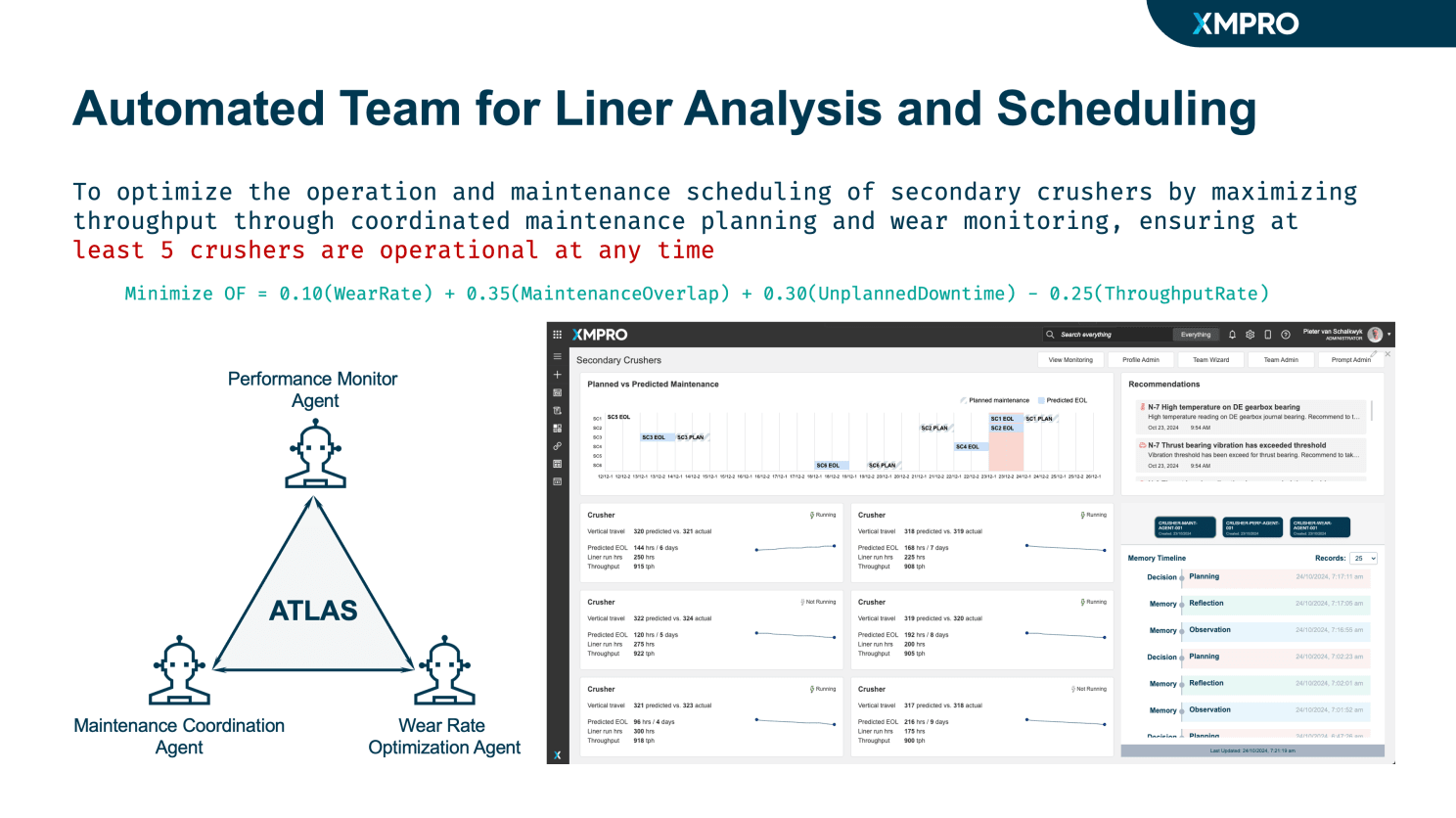
A Three-Agent MAGS Team Optimizing Maintenance Schedules for Liner replacements on Secondary Crushes in Mining to avoid unplanned downtime due to liner wear. ATLAS is the team name and stands for Automated Team for Liner Analysis and Scheduling
This transformation allows human operators, planners, and managers to focus their expertise on high-value activities like complex problem-solving, root cause analysis, and strategic planning rather than being overwhelmed by routine operational tasks.
2. Functions Like Industrial Control Systems
MAGS implements a sophisticated control loop through the Observe, Reflect, Plan, and Act (ORPA) cycle, mirroring the proven principles of traditional industrial control systems. Each agent operates with specific Objective Functions that define its goals and constraints, much like PID controllers and other industrial control elements.
The agents continuously observe real-time data streams, reflect on this data against their defined objectives and historical patterns, plan optimal adjustments using a combination of rule-based and generative AI algorithms, and act autonomously within clearly defined Safe Operating Envelopes.
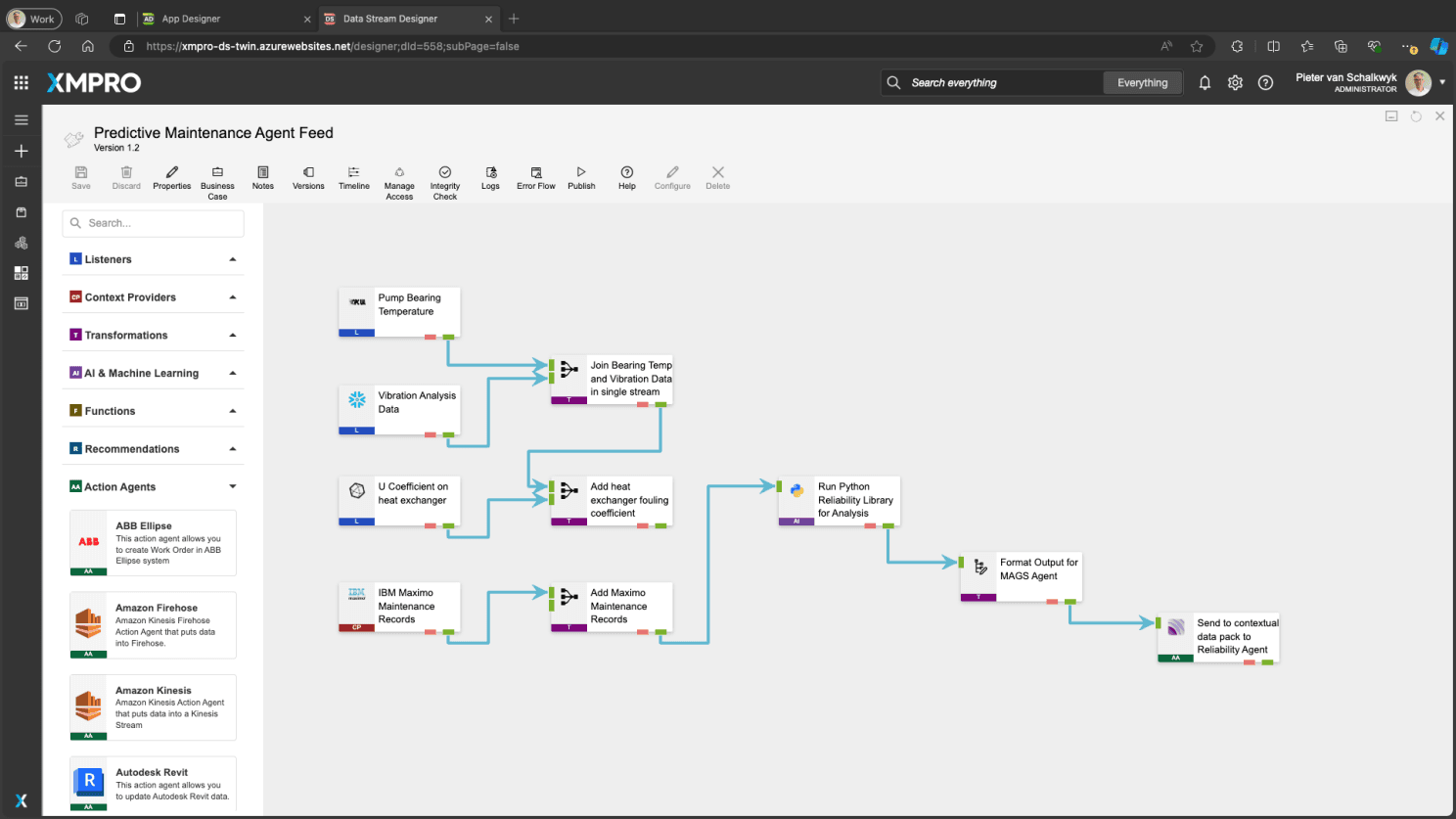
XMPro DataStream with real-time operations data for MAGS Agent in a controlled pipeline
This systematic closed-loop approach ensures consistent, measurable performance improvements that can be validated against specific Objective Functions, such as minimizing energy consumption while maintaining production targets.
The familiar control system architecture allows automation engineers and subject matter experts to manage complex operational business processes using the same methodologies and rigor they apply to automation and control systems, but now extended beyond traditional equipment control to encompass broader operational optimization.
3. Enables Machine Intelligence (MIMO)
MAGS enhances machine intelligence by deploying specialized AI agents that analyze and optimize millions of data points daily through a Machine Intelligence for Manufacturing and Operations (MIMO) framework based on the research at MIT, for example. These agents work as an autonomous team to continuously process millions of monitoring events daily, simultaneously optimizing hundreds of variables across multiple machines and processes – a scale of complexity far beyond human cognitive capabilities.
What makes this approach particularly powerful is the agents’ ability to discover novel operational configurations that human operators might never consider. For example, by analyzing complex interactions between equipment settings, environmental conditions, and production parameters, MAGS can identify counterintuitive but highly efficient operating states that dramatically improve performance while reducing energy consumption and maintenance needs. Human oversight in controlled testing environments can validate these novel new approaches before deploying them to production systems.
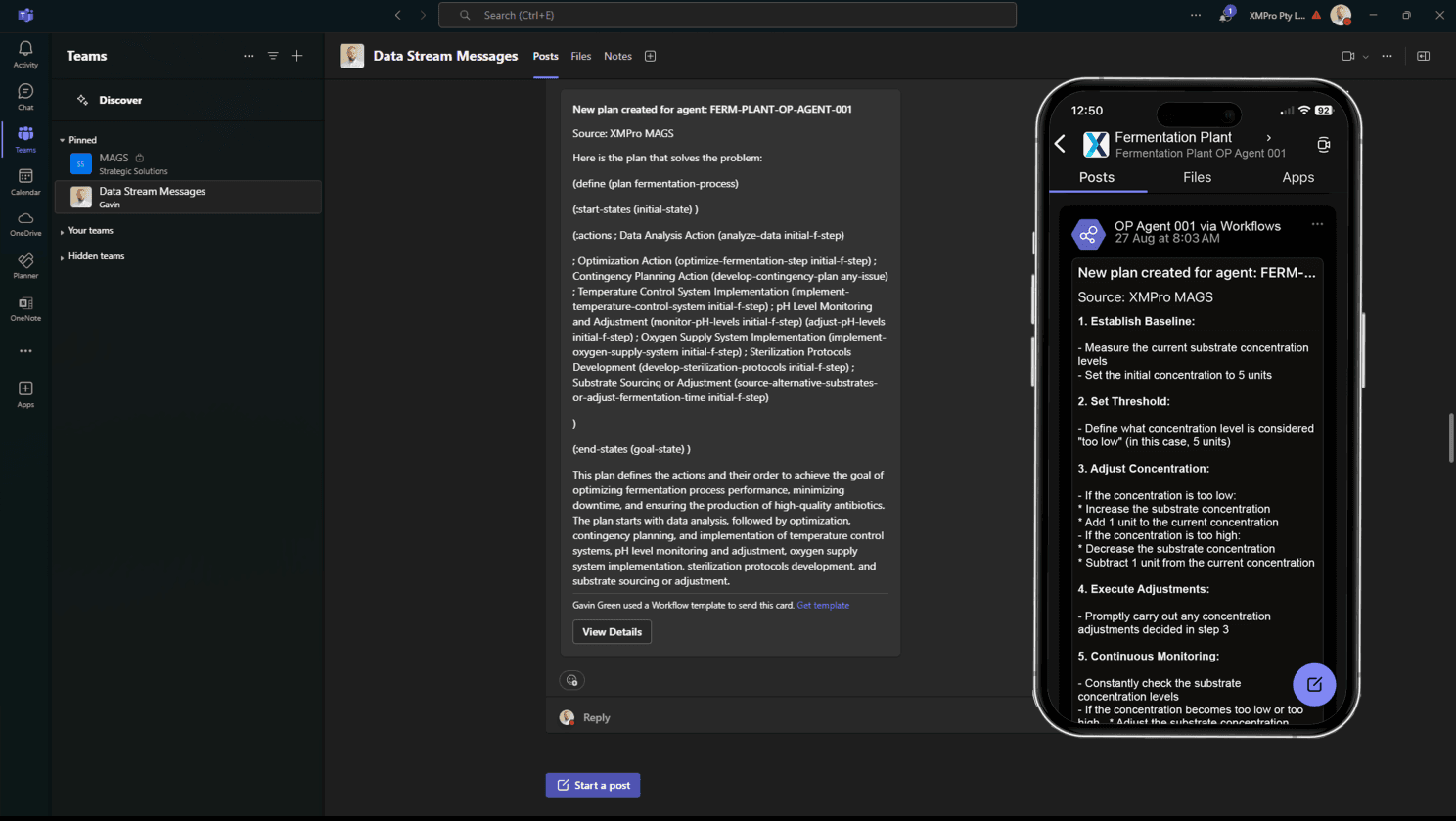
Interact with Team or individual agents and provide instructions, suggestions, and training
These agents autonomously monitor and adjust variables in real-time, managing everything from equipment performance to predictive maintenance and quality control, creating a self-organizing system that enables complex, scalable decision-making and optimization. The result is a continuously optimizing environment that delivers measurable efficiency improvements worth millions in annual savings, adapting to changing conditions without requiring constant human supervision while consistently finding optimal solutions that challenge traditional operating assumptions.
Call to Action
MAGS represents a transformative leap in industrial operations, delivering three critical advantages:
- Reduces cognitive load, enabling operators to focus on strategic decisions
- Provides a control system approach for reliable, measurable performance
- Drives continuous improvement through machine intelligence and optimized processes
As industrial systems grow more complex and the pressure for operational efficiency increases, organizations need innovative solutions to address their operational challenges. MAGS offers a powerful approach that combines proven control system principles with advanced AI capabilities to transform industrial operations. This is why I see MAGS as the killer app for Generative AI in industrial applications.
If you face these challenges in your operations and want to explore how MAGS can help, don’t hesitate to get in touch with me to discuss a pilot project.
Our GitHub Repo has more technical information if you are interested. You can also contact myself or Gavin Green for more information.
Read more on MAGS at The Digital Engineer
PS. While I experimented with AI assistance in drafting my articles, I found the MAGS concept too novel for current AI systems to grasp effectively. All ideas and insights shared here are my original work. I used Claude AI for editorial improvements, following my structured guidelines for clarity, readability, and professional tone.
Improve this paragraph of the LinkedIn article using: Audience: Target senior managers and technical readers Aim for 15-20 words per sentence Aim for 3-5 sentences per paragraph Use the Flesch-Kincaid Grade Level to gauge readability. Aim for a Grade Level of 10 for a broader business audience. Maintain a Professional, friendly and firm tone like that of Pieter van Schalkwyk, CEO of XMPro Avoid marketing jargon. Avoid words like "realm", "poised", "paradigms", "pivotal", "delves", "cutting-edge", "elevate", "unprecedented", "revolutionize", "enhance", "groundbreaking" Use bullets or numbers in the texts where appropriate










